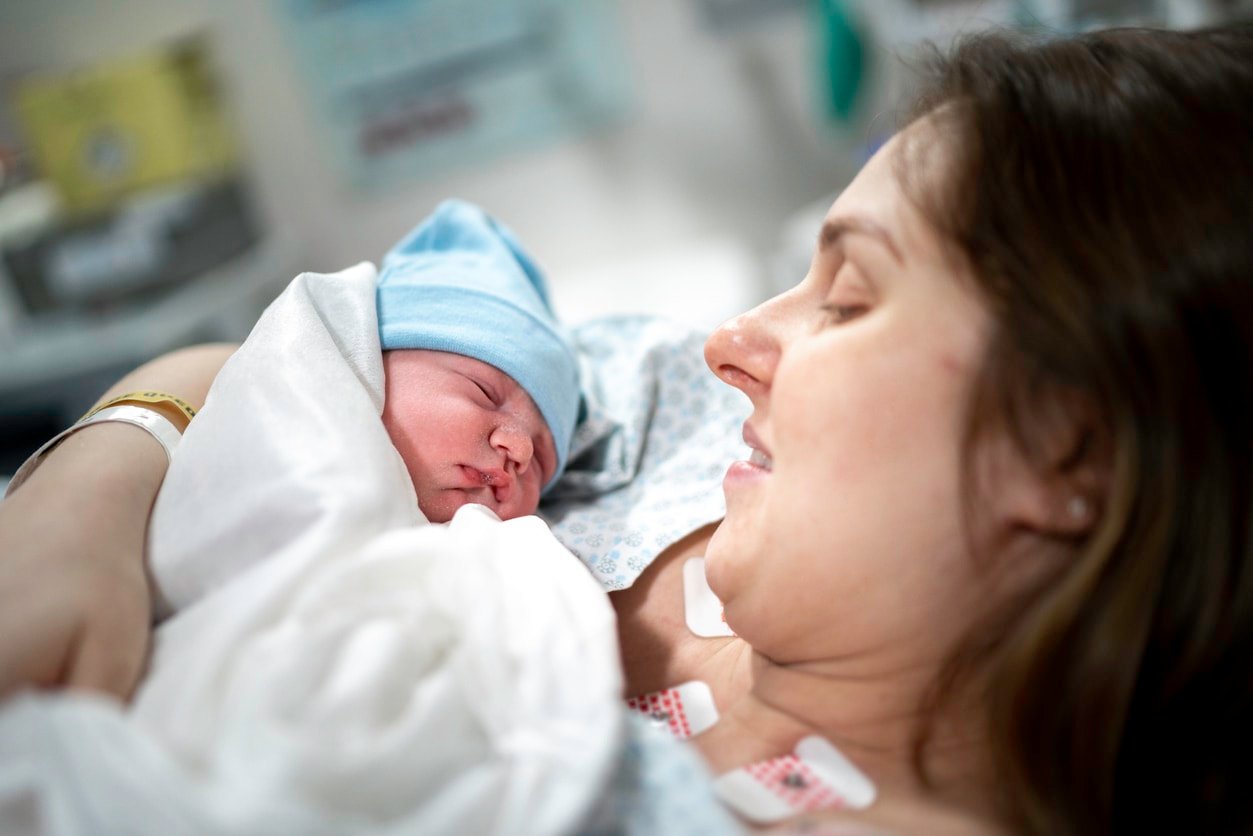
There are many things about pregnancy and childbirth that no one tells you. Postpartum shaking is one of those unmentionable childbirth things that many pregnant people experience. Temporary, uncontrollable shaking or trembling commonly occurs just before or after the delivery of your baby. Postpartum shaking can be startling and unnerving, especially when it’s unexpected. Any labor nurse, midwife, or obstetrician can assure these tremors are normal. But what is the cause of these movements, and can anything be done about it?
What is Postpartum Shaking?
Postpartum shaking is a phenomenon that approximately 23% to 44% of women experience following the delivery of their newborn. This is not shivering from feeling cold. This hijacking results in whole-body shaking or trembling that differs in duration and intensity for each pregnant person. Think mild chills to teeth-chattering tremors.2
It can occur after the delivery of your newborn or after the delivery of the placenta, but it may not happen right away or at all. The shaking can start immediately or up to 30 minutes post-delivery and may last for up to an hour.2
What Causes Postpartum Shaking?
The exact cause of postpartum shaking is unclear and understudied. Suggestions include body temperature changes, environmental temperature, blood loss, blood interactions between baby and parent, and hormonal changes. Let’s talk about the most likely cause of postpartum shaking.2
Labor and Delivery Hormones
Hormone shifts are blamed for postpartum shaking, though the exact process is unknown.
Labor causes a stress response in your body. Think fight or flight. Stress hormones are responsible for helping the body cope with the intensity of labor. The complex stress response helps to control pain, elevate your internal temperature, increase your heart and breathing rates, and regulate your uterus’ response to prostaglandins and oxytocin hormones. This hormone release can cause nausea, vomiting, and diarrhea, all common symptoms during labor.6
Stress hormones result in the release of oxytocin and prostaglandins. These hormones prepare the cervix for dilation and cause uterine contractions. The concentration of oxytocin and stress hormones increases as your baby descends, and your cervix dilates to create a continuous loop of hormone release until you deliver your baby.6
This intense rush and then unloading of hormones, coupled with the extraordinary emotional and physical trials of labor, may account for postpartum shaking.6
Causes of Shaking During Labor
Shaking, tremors, or chills during labor could be caused by several factors.
Imminent Delivery
Shaking can occur during the “transition” phase of labor. This transition happens during the active phase of the first stage of labor that begins at six centimeters of dilation. At this point, cervical changes may occur more rapidly, especially for those who have had children previously. Shaking, nausea, vomiting, jitteriness, anxiety, or panic can happen as you reach full dilation or 10 centimeters. Shaking before the baby’s delivery likely occurs for the same reason that shaking happens after delivery.1
Anesthesia
Epidural anesthesia can cause shaking or tremors. The strong medications used in epidural infusions inhibit vasoconstriction or blood vessel tightening and sweating in the lower body. The heat loss can make the body think it is hypothermic or too cold and cause shivering.4
Additionally, epidural anesthesia causes fever in over 20% of women, another potential reason for chills, shaking, or trembling.3
Fever
Fever during labor can occur for various reasons. A common cause of fever during childbirth is chorioamnionitis, or an infection of the amniotic fluid and placenta.5
Is Postpartum Shaking Normal?
Yes, postpartum shaking is normal. Though it may feel troublesome or distressing, your body is only having an expected and necessary physiological response to an amazing feat, the delivery of your newborn.
What You Can Do
No medical intervention can stop postpartum shaking, nor is it necessary to stop since it’s normal and temporary. Any care given to address the shaking is supportive and meant to relax you and your body from the stress response. Your labor and delivery nurse may suggest the following to help you cope with shaking:
- Get under some blankets. While the shakes are not necessarily a result of the cold, blankets can have a relaxing and comforting effect that can be helpful.
- Focus on your newborn. Admire your baby, snuggle close with some skin-to-skin, or start breastfeeding. The natural feel-good oxytocin release can soothe your stress response.6
- Drink warm fluids and eat. If tolerable, a warm drink may help regulate your temperature, and a meal can restore your energy and balance your blood sugar.
Occasionally, some people experience intense shaking that may impact their ability to hold a newborn. Do not hesitate to hand your baby to your partner or nurse if you feel unsafe until the shaking passes.
The childbirth experience can be filled with unfamiliar circumstances, conflicting and dramatic emotions, and new physical sensations. Uncontrollable postpartum shaking can be unsettling. Find comfort in the fact that it is temporary and normal. Lean into your nurse or obstetric provider for strategies to cope with your body’s response to your incredible accomplishment.
from Baby Chick https://ift.tt/xCrBbom
via IFTTT


0 Comments
Please ,
Don't enter span link ...